- Home
- Daniel Quinn
The Story of B Page 26
The Story of B Read online
Page 26
In the absence of any other theory, it seemed reasonable (even inescapable) to suppose that the human race must have begun with a single human couple, an original man and woman. There was nothing inherently irrational or improbable about such a supposition. The existence of an original man and woman didn’t argue for or against an act of divine creation. Maybe that’s just the way things start. Maybe at the beginning of the world there was one man and one woman, one bull and one cow, one horse and one mare, one hen and one cock, and so on. Who at this point knew any better? Our cultural ancestors knew nothing about any agricultural “revolution.” As far as they knew, humans had come into existence farming, just the way deer had come into existence browsing. As they saw it, agriculture and civilization were just as innately human as thought or speech. Our hunting-gathering past was not just forgotten, it was unimaginable.
The Great Forgetting was woven into the fabric of our intellectual life from its very beginning. This early weaving was accomplished by the nameless scribes of ancient Egypt, Sumer, Assyria, Babylon, India, and China, then, later, by Moses, Samuel, and Elijah of Israel, by Fabius Pictor and Cato the Elder of Rome, by Ssu-ma T’an and his son Ssu-ma Ch’ien in China, and, later still, by Hellanicus, Herodotus, Thucydides, and Xenophon of Greece. (Although Anaximander conjectured that everything evolved from formless material—what he called “the boundless”—and that Man arose from fishlike ancestors, he was as unaware of the Great Forgetting as any of the others.) These ancients were the teachers of Isaiah and Jeremiah, Lao-tzu and Gautama Buddha, Thales and Heraclitus—and these were the teachers of John the Baptist and Jesus, Confucius and Socrates, Plato and Aristotle—and these were the teachers of Muhammad and Aquinas and Bacon and Galileo and Newton and Descartes—and every single one of them unwittingly embodied and ratified the Great Forgetting in their works, so that every text in history, philosophy, and theology from the origins of literacy to almost the present moment incorporated it as an integral and unquestioned assumption.
Now I hope—I sincerely hope—that there are many among you who are burning to know why not a single one of you has ever heard a word about the Great Forgetting (by any name whatsoever) in any class you have ever attended at any school at any level, from kindergarten to graduate school. If you have this question, be assured that it’s not an academic one by any means. It’s a vital question, and I don’t hesitate to say that our species’ future on this planet depends on it.
The Great Remembering
What was forgotten in the Great Forgetting was not that humans had evolved from other species. There isn’t the slightest reason to think that Paleolithic humans or Mesolithic humans guessed that they had evolved. What was forgotten in the Great Forgetting was the fact that, before the advent of agriculture and village life, humans had lived in a profoundly different way.
This explains why the Great Forgetting was not exposed by the development of evolutionary theory. Evolution in fact had nothing to do with it. It was paleontology that exposed the Great Forgetting (and would have done so even if no theory of evolution had ever been proposed). It did so by making it unarguably clear that humans had been around long, long, long before any conceivable date for the planting of the first crop and the beginning of civilization.
Paleontology made untenable the idea that humanity, agriculture, and civilization all began at roughly the same time. History and archaeology had put it beyond doubt that agriculture and civilization were just a few thousand years old, but paleontology put it beyond doubt that humanity was millions of years old. Paleontology made it impossible to believe that Man had been born an agriculturalist and a civilization-builder. Paleontology forced us to conclude that Man had been born something else entirely—a forager and a homeless nomad—and this is what had been forgotten in the Great Forgetting.
It staggers the imagination to wonder what the foundation thinkers of our culture would have written if they’d known that humans had lived perfectly well on this planet for millions of years without agriculture or civilization, if they’d known that agriculture and civilization are not remotely innate to humans. I can only conclude that the entire course of our intellectual history would have been unthink-ably different from what we find in our libraries today.
But here is one of the most amazing occurrences in all of human history. When the thinkers of the eighteenth, nineteenth, and twentieth centuries were finally compelled to admit that the entire structure of thought in our culture had been built on a profoundly important error, absolutely nothing happened.
It’s hard to notice nothing happening. Everyone knows that. Readers of Sherlock Holmes will remember that the remarkable thing the dog did in the night was … nothing. And this is the remarkable thing that these thinkers did: nothing. Obviously they didn’t care to do anything. They didn’t care to go back to all the foundation thinkers of our culture and ask how their work would have changed if they’d known the truth about our origins. I fear the truth is that they wanted to leave things as they were. They wanted to go on forgetting … and that’s exactly what they did.
Of course they were forced to make some concessions. They couldn’t go on teaching that humans had been born farming. They had to deal with the fact that farming was a very recent development. They said to themselves, “Well, let’s call it a revolution—the Agricultural Revolution.” This was slovenly thinking at its worst, but who was going to argue about it? The whole thing was an embarrassment, and they were glad to dismiss it with a label. So it became the Agricultural Revolution, a new lie to be perpetuated down through the ages.
Historians were sickened to learn the true extent of the human story. Their whole discipline, their whole worldview, had been shaped by people who thought that everything had begun just a few thousand years ago when people appeared on the earth and started immediately to farm and to build civilization. This was history, this story of farmers turning up just a few thousand years ago, turning farming communes into villages, villages into towns, towns into kingdoms. This was the stuff, it seemed to them. This was what counted, and the millions of years that came before deserved to be forgotten.
Historians wouldn’t touch this other stuff, and here’s the excuse they fashioned for themselves. They didn’t have to touch it … because it wasn’t history. It was some newfangled thing called prehistory. That was the ticket. Let some inferior breed handle it—not real historians, but rather prehistorians. In this way, modern historians put their stamp of approval on the Great Forgetting. What was forgotten in the Great Forgetting was not something important, it was just prehistory. Something not worth looking at. A huge, long period of nothing happening.
The Great Remembering was in this way turned into a nonevent. The intellectual guardians of our culture—the historians, the philosophers, the theologians—didn’t want to hear about it. The foundations of all their disciplines had been laid during the Great Forgetting, and they didn’t want to reexamine those foundations. They were perfectly content to have the Great Forgetting go on—and, for all practical purposes, it did exactly that. The worldview we transmit to our children today is fundamentally the same as the worldview transmitted to children four hundred years ago. The differences are superficial. Instead of teaching our children that humanity began just a few thousand years ago (and didn’t exist before that), we teach them that human history began just a few thousand years ago (and didn’t exist before that). Instead of teaching our children that civilization is what humanity is all about, we teach them that civilization is what history is all about. But everyone knows that it comes to the same thing.
In this way human history is reduced to the period exactly corresponding to the history of our culture, with the other ninety-nine-point-seven percent of the human story discarded as a mere prelude.
The myth of the Agricultural Revolution
That the earth is the motionless center of the universe was an idea that people accepted for thousands of years. In itself, it seems harmless enough, but it spawne
d a thousand errors and put a limit on what we could understand about the universe. The idea of the Agricultural Revolution that we learn in school and teach our children in school seems similarly harmless, but it too has spawned a thousand errors and puts a limit on what we can understand about ourselves and what has happened on this planet.
In a nutshell, the central idea of the Agricultural Revolution is this, that about ten thousand years ago, people began to abandon the foraging life in favor of agriculture. This statement misleads in two profoundly important ways: first, by implying that agriculture is basically just one thing (the way that foraging is basically just one thing), and second, by implying that this one thing was embraced by people everywhere at more or less the same time. There is so little truth in this statement that it isn’t worth bothering with, so I’ll just issue another one:
Many different styles of agriculture were in use all over the world ten thousand years ago, when our particular style of agriculture emerged in the Near East. This style, our style, is one I call totalitarian agriculture, in order to stress the way it subordinates all life-forms to the relentless, single-minded production of human food. Fueled by the enormous food surpluses generated uniquely by this style of agriculture, a rapid population growth occurred among its practitioners, followed by an equally rapid geographical expansion that obliterated all other lifestyles in its path (including those based on other styles of agriculture). This expansion and obliteration of lifestyles continued without a pause in the millennia that followed, eventually reaching the New World in the fifteenth century and continuing to the present moment in remote areas of Africa, Australia, New Guinea, and South America.
The foundation thinkers of our culture imagined that what we do is what people everywhere have done from the beginning of time. And when the thinkers of the nineteenth century were forced to acknowledge that this wasn’t the case, they imagined instead that what we do is what people everywhere have done for the past ten thousand years. They could easily have availed themselves of better information, but they obviously didn’t think it was worth bothering with.
East and West
It’s become a solid part of our cultural mythology that a profound gulf separates East from West, “and never the twain shall meet,” and this causes people to be disconcerted when I speak of East and West as a single culture. East and West are twins, with a common mother and father, but when these twins look at each other, they’re struck by the differences they see, not the similarities, just the way biological twins are. It takes an outsider like me to be struck by the fundamental cultural identity that exists between them.
Nothing could be more fundamental to any people than the way they get the wherewithal to live. The people of our culture, East and West, do this by means of totalitarian agriculture, and have done so from the beginning—the same beginning; for the past ten thousand years the people of both East and West have built squarely, solidly, and exclusively on totalitarian agriculture as their base. There’s not a single thing to choose between them in this regard.
Totalitarian agriculture is more than a means of getting what you need to live, it’s the foundation for the most laborious lifestyle ever developed on this planet. This comes as a shock to many listeners, but there isn’t any question about it: No one works harder to stay alive than the people of our culture do. This has been so thoroughly documented in the past forty years that I doubt if you could find an anthropologist anywhere who would argue about it.
It’s my notion that the laboriousness of their lifestyle has given rise to another fundamental similarity between the peoples of East and West, and this is the similarity in their spiritual outlook. Again, it’s commonplace to imagine that an enormous gulf separates East and West in this regard, but the two of them look like twins to me, because they’re both obsessed by the strange idea that people need to be saved. In recent decades, the Salvationist coloration of Eastern religions has been toned down for export to Beat, hippie, and New Age markets, but it’s unmistakable when seen in the originals, in native habitats.
It’s certainly true that the ends and means of salvation differ between East and West, but then the ends and means of salvation differ among all the Salvationist religions of the world—this is precisely how you tell them apart. The essential fact remains that, anywhere in the world, East or West, you can walk up to a stranger and say, “Let me show you how to be saved,” and you’ll be understood.
The nothingness of prehistory
When the foundation thinkers of our culture looked back in time, past the appearance of man the agriculturalist, they saw … nothing. This was what they expected to see, since, as they had it worked out, people could no more exist before agriculture than fish could exist before water. To them, the study of preagricultural man would have seemed like the study of nobody.
When the existence of preagricultural man became undeniable in the nineteenth century, the thinkers of our culture didn’t care to disturb the received wisdom of the ancients, so the study of preagricultural man became the study of nobody. They knew they couldn’t get away with saying that preagricultural peoples lived in nonhistory, so they said they lived in something called prehistory. I’m sure you understand what prehistory is. It’s rather like prewater, and you all know what that is, don’t you? Prewater is the stuff fish lived in before there was water, and prehistory is the period people lived in before there was history.
As I’ve pointed out again and again, the foundation thinkers of our culture imagined that Man had been born an agriculturalist and a civilization-builder. When thinkers of the nineteenth century were forced to revise this imagining, they did it this way: Man may not have been born an agriculturalist and a civilization-builder, but he was nonetheless born to become an agriculturalist and a civilization-builder. In other words, the man of that fiction known as prehistory came into our cultural awareness as a sort of very, very slow starter, and prehistory became a record of people making a very, very slow start at becoming agriculturalists and civilization-builders. If you need a tip-off to confirm this, consider the customary designation of prehistoric peoples as “Stone Age”; this nomenclature was chosen by people who didn’t doubt for a moment that stones were as important to these pathetic ancestors of ours as printing presses and steam locomotives were to the people of the nineteenth century. If you’d like to get an idea of how important stones were to prehistoric peoples, visit a modern “Stone Age” culture in New Guinea or Brazil, and you’ll see that stones are about as central to their lives as glue is to ours. They use stones all the time, of course—as we use glue all the time—but calling them Stone Age people makes no better sense than calling us Glue Age people.
The myth of the Agricultural Revolution (cont.)
The foundation thinkers of our culture envisioned the descent of Man this way:
The reluctant revisers of the nineteenth century emended the descent of Man to look like this:
Naturally, they didn’t hesitate to assume that the whole of the human story was all leading up to “Us”—the people of our culture—and this is the way it’s been taught in our schools ever since. Unfortunately, like so much of the thinking that was done at this point, this was so grotesquely false to facts as to make flat-earth cranks look like intellectual giants.
Here is how it must look if you begin by acknowledging the fact that the people of our culture are not the only humans on this planet:
This diagram reveals a split in humanity far more profound than the one we see dividing East and West. Here we see the split that occurred between those who experienced the Great Forgetting and those who did not.
The Law of Limited Competition
During the Great Forgetting it came to be understood among the people of our culture that life in “the wild” was governed by a single, cruel law known in English as “the Law of the Jungle,” roughly translatable as “kill or be killed.” In recent decades, by the process of looking (instead of merely assuming), ethologists have discove
red that this “kill or be killed” law is a fiction. In fact, a system of laws—universally observed—preserves the tranquillity of “the jungle,” protects species and even individuals, and promotes the well-being of the community as a whole. This system of laws has been called, among other things, the peacekeeping law, the law of limited competition, and animal ethics.
Briefly, the law of limited competition is this: You may compete to the full extent of your capabilities, but you may not hunt down your competitors or destroy their food or deny them access to food. In other words, you may compete but you may not wage war on your competitors.
The ability to reproduce is clearly a prerequisite for biological success, and we can be sure that every species comes into existence with that ability as an essential heritage from its parent species. In the same way, following the law of limited competition is a prerequisite for biological success, and we can be sure that every species comes into existence following that law as an essential heritage from its parent species.
Humans came into existence following the law of limited competition. This is another way of saying that they lived like all other creatures in the biological community, competing to the full extent of their capacity but not waging war on their competitors. They came into existence following the law and continued to follow the law until about ten thousand years ago, when the people of a single culture in the Near East began to practice a form of agriculture contrary to the law at every point, a form of agriculture in which you were encouraged to wage war on your competitors—to hunt them down, to destroy their food, and to deny them access to food. This was and is the form of agriculture practiced in our culture, East and West—and in no other.

 The Story of B
The Story of B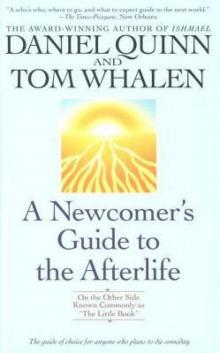 A Newcomer's Guide to the Afterlife: On the Other Side Known Commonly as the Little Book
A Newcomer's Guide to the Afterlife: On the Other Side Known Commonly as the Little Book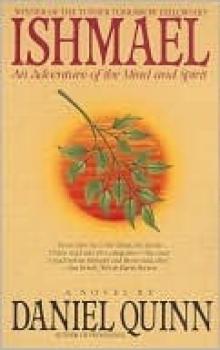 Ishmael: An Adventure of the Mind and Spirit
Ishmael: An Adventure of the Mind and Spirit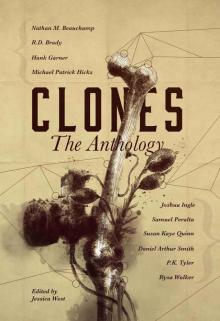 CLONES: The Anthology
CLONES: The Anthology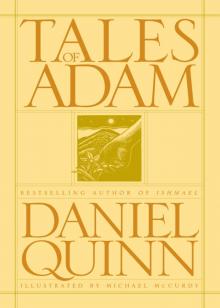 Tales of Adam
Tales of Adam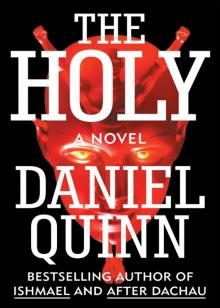 The Holy
The Holy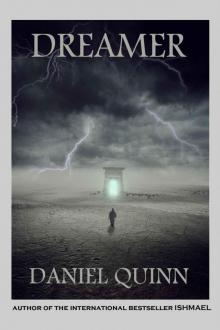 Dreamer
Dreamer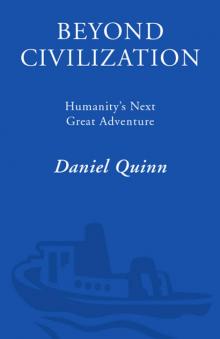 Beyond Civilization: Humanity's Next Great Adventure
Beyond Civilization: Humanity's Next Great Adventure After Dachau
After Dachau If They Give You Lined Paper, Write Sideways.
If They Give You Lined Paper, Write Sideways.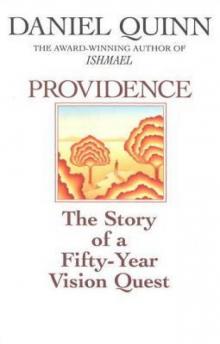 Providence
Providence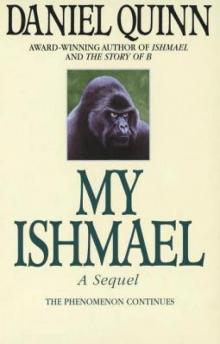 My Ishmael
My Ishmael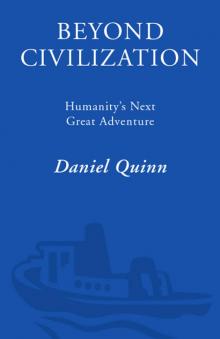 Beyond Civilization
Beyond Civilization If They Give You Lined Paper, Write Sideways
If They Give You Lined Paper, Write Sideways Ishmael
Ishmael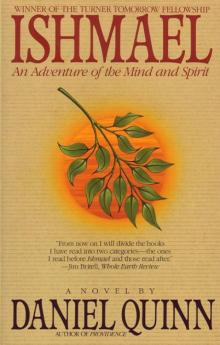 Ishmael i-1
Ishmael i-1 A Newcomer's Guide to the Afterlife
A Newcomer's Guide to the Afterlife